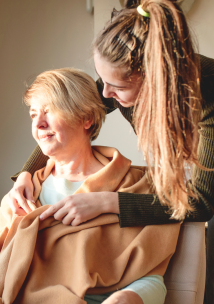Report: Conversations about end-of-life care in South Gloucestershire

We asked people about:
- Improvements that individuals and loved ones would make to palliative and end of life care.
- How individuals and loved ones can share their feedback about palliative and end of life care.
- How care can be personalised to meet the needs of every person.
Our goal was to identify good practice and give health and social care professionals who are involved in end-of-life care information about what people felt could be done better.
We also wanted to identify what people feel is most important in terms of support, and any gaps in people's care.
For me to be empowered, I needed information. I was there as my partner’s carer and needed to be acknowledged as that (which I wasn’t).
Downloads
Key messages: what matters most to people?
- Dignity and respect for those at the end-of-life, their families and carers
- Better communication between health professionals and families, and carers
- Clear communication between different hospital departments
- Timely communication about end-of-life by medical staff to families and carers whilst people are in hospital.
- Privacy whilst family members are dying in hospital wards, particularly during family visits
- Ensuring that end-of-life Care Plans are in place, that final wishes are communicated to hospital or care home staff
- Acknowledgement of carers’ roles
- Involvement of carers in end-of-life care planning for those living at home, in residential care homes or in hospital
- Respite support for carers looking after their families and relatives at end-of-life
- Need for support for self-care for carers and families of the dying
- Choice of care – at home, in residential care or in hospital
- Choice of where to die (home, care home or hospital)
Recommendations
- Community health and social care professionals to signpost families and carers to available end-of-life care support in their communities, including hospices and relevant charities.
- Hospital trusts to ensure health care professionals involve family carers in end-of-life planning.
- Hospital trusts and healthcare professionals to improve information on the eligibility criteria and the support provided by hospice services.
- Hospital trusts to ensure improved communication between healthcare professionals and people and their families about when someone is at the end-of-life stage
- Hospital trusts and healthcare professionals to improve communication with patients, families and carers on personal wishes about location of end-of-life.
- Hospital trusts to improve communication about hospital discharge at end-of-life stage and involvement of families and carers in this process.
Andy Newton, Head of Integrated Care, NHS Bristol, North Somerset and South Gloucestershire ICB, said:
"End of Life Care in Bristol North Somerset and South Gloucestershire is delivered by a range of provider organisations, including hospice care, community services, acute trust and the voluntary sector. All the providers are represented at the End of Life Collaborative group – a joint forum to support the development and improvement of services across organisations, and advocate for End of Life Care. The ICB will circulate this report to the End of Life Collaborative to agree any subsequent actions together and incorporate in plans to develop end of life care services."
If you would like to share your feedback about end-of-life care in South Gloucestershire, click the pink 'Talk to us' button below and complete our online feedback form.

